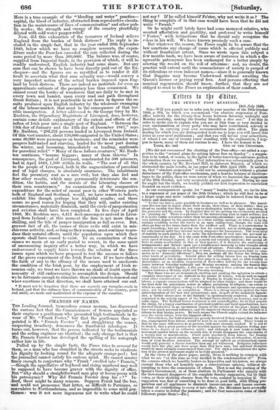CHANGES OF NAMES.
Tam Leading Yournal, tremendous censor morum, has discovered the curious fact that the Commissioners of Sewers appointed as their engineer a gentleman who presented high testimonials in fa- your of Mr. "Frank Foster," but that the gentleman thus ap- pointed is Mr. "Francis Forster " • and straightway the censor, suspecting treachery, denounces the fraudulent interloper. It turns out, however, that the person indicated by the testimonials and the acting engineer are identical; the onl- strange fact is that Mr. Francis Forster has developed the spelling of his autograph rather late in life.
Pulled up by the simple facts, the Times tries to account for them, as a man who has stumbled in the streets seeks to vindicate his dignity by looking round for the adequate orange-peel; but journalist ournalt cannot satisfy his curious mind. He cannot muster fancy enough to conjecture why " Frank " swelled into "Francis," —though the appeRative of boyhood and rising manhood may well be supposed to lave become graver with the dignity of office. But" why should a straightforward man play at hocus-pocus with his patronymic? Why did Francis Forster drop his r?" In- deed, there might be many reasons. Suppose Frank had the bur, and could not pronounce that letter, so difficult to Parisians, so convulsive to N-orthinnbrians, and so impossible to some mild gen- tlemen: was it not more ingenuous not to write what he could
not say ? If he called himself Fo'ster, why not write it so ? The thing to complain of in that case would have been that he did net -write " Funink."
Or he might until lately have had some moneyed relative, who scouted affectation and gentility, and preferred to write himself "Foster," with intimations that he should only recognize the r-less in his will. We have known precisely such a case. But whatever the reason, the Times ought to be aware that the- law sanctions any change of name which is ()acted publicly and without fraudulent intent. Since we wrote upon this subject a few months back, we have been aware of instances in which a die. agreeable patronymic has been exchanged for a better simply by altering the record on the roll of attornies : and, no doubt, the practice will extend until the nomenclature of society is purged of its ridiculous or even indecent names,—since it is generally known that Buggins may become Underwood without awaiting the Queen's licence or paying royal fees. And persons effecting that nominal regeneration should know, further, that they are not obliged to send to the Titnes an explanation of their conduct.


























 Previous page
Previous page